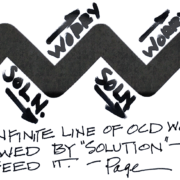When I work with adult children who suffered from childhood trauma, the single most difficult thing to believe is also the most difficult to help them shift.

You can shift to self-love.
There are so many different, and mixed, messages that a child can absorb when they are going through emotional, physical, sexual, and/or financial abuse, which looks like neglect. (Think parental lack of literal care like bathing, dressing, and feeding a child, leaving it to them to do on their own.) When childhood trauma takes place over an extended amount of time, the results are even more devastating. The same emotional patterns of parental behavior often continue into adulthood, even though the parent no longer has physical or financial control over the adult child.
The damage, or fallout, from childhood trauma continues even when the parent is deceased or mentally incapacitated, such as when dementia is present. Then guilt often enters the picture. The damage adult children suffer is powerful, pervasive, persistent, and predictable.
The damage adult children suffer is powerful, pervasive, persistent, and predictable.–Page Rutledge, LCSW
Some of the messages received as a result of abuse are below, but they are by no means all inclusive.
- Being sexually abused by a parent or relative, especially when the parent knew and would not intervene, or even denied it.
- Simply not providing the emotional connection that makes a child feel loved, seen and heard—emotional neglect is silently deadly.
- Favoritism of one or more children over the other, even excluding them from family events as a result.
- Denying a child’s sexuality or gender identification when it conflicts with a parent’s belief system. The extremes of this denial often result in suicide for the child.
- Parents who are extremely controlling, or expect too much from a child, or expect areas of success that are not within the child’s abilities or desires.
- Scapegoating one child as overly sensitive, making them “the problem child.”
- Excluding a child for their choice of romantic partner, or career choice, or lifestyle choice.
Limited Insight And Limited Emotional Capacity
Many of the abusive parents came from their own troubled families. It is a generational problem. They often have very limited insight, or a limited emotional capacity to reflect on their choices. Sadly, they are not going to change, even though the child may continue longing for this change. Longing for a parent who simply loves them as they are without trying to continually extract what they need (and can never get) from their child.
Damage From Childhood Trauma
When you move through your adult life, the damage from these forms of abuse have many, many, often devastating, outcomes. This ranges from abusing their own children to suicide with many shades in between. For these adult children, the inability to move on from it and build a happy life for themselves and their families is common. Being emotionally insecure in their adult relationships is also a common outcome that replays itself over and over.
Happily many also veer 180 degrees in the opposite direction, focused on being the best partner they can be, or the best parent they can become. This, too, has the potential downside of perfectionism and people pleasing to an extreme.
The Single Most Difficult Thing To Believe
However, the single most difficult thing to believe for most of these adult children is this. You are worthy, and you are worth it. You are enough. This core belief of feeling unworthy is difficult to shift. It is the hardest work any adult can choose to do. But, oh, it is so worth it. This deeply deeply held belief of “I must be worthless if my own parents could treat me this way” is hard, hard to shift.
Shining A Light On The Difficult To See
Shining a light on your childhood trauma and what happened to you, and how it affected your choices, can be a difficult process. It stirs sadness about what you lost or never had. But that’s light for you, it doesn’t discriminate on the the good or the bad. It reveals.
But it can be done if you are willing to commit to shifting towards self-love and setting the boundaries that make you feel safe. Learning to say no. Allowing yourself to say yes when you choose to do so. Yes to the future you want and deserve simply for being you.
If you want this for yourself, contact me here. Get started now. There is no better “revenge” than success for yourself. And success has many forms, not the least of which is valuing yourself. Acknowledging your anger and talking about it with someone you trust, and setting clear boundaries, are proven ways to get past this kind of deep hurt. You can do this for yourself, and those you love.
Resource for you: Adult Children of Emotionally Immature Parents, by Lindsay C. Gibson, PsyD, 2015











